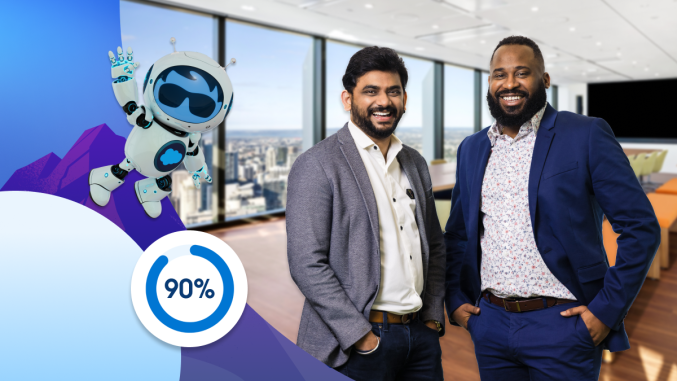Broadcasting
The Exciting Relationship Between Women and Mobile Money in Africa

By Rashi Gupta, Group Chief Operating Officer at MFS Africa
The success of mobile money in Africa is well known. If you’ve paid any attention to the continent’s financial and technology spaces over the past decade or so, you probably won’t be surprised to learn that it accounts for around 70% of the world’s US$1 trillion mobile money value.

You’d probably also be unsurprised to learn that in Kenya, the country that effectively kick-started Africa’s mobile money revolution, mobile money transactions now account for 56.8% of GDP. What you might not know is that mobile money has long played (and continues to play) an important role in empowering women across Sub-Saharan Africa.
That’s important because, despite gains in representation (in 11 African countries, women hold over a third of parliamentary seats, more than in Europe), gender inequality remains stark across Africa. While there are obviously differences from country to country, women throughout the continent fare worse than their male counterparts in a number of measures, including wages, investment, access to capital, and education.
Of course, mobile money can’t fix all of those issues on its own. That requires serious investment as well as shifts in policy and societal attitudes. But it can play a significant role in making life better for women across the continent, especially when it comes to financial inclusion.
Taking care of business
That’s not just conjecture either. Research conducted on behalf of the World Bank shows just how substantial the impact has been. It notes, for example, that mobile money has enabled Kenyan women to move away from subsistence farming and towards business and retail, helping alleviate poverty in the country.
The research further notes that, for individuals and households, mobile phones can help reduce transaction costs, lower travel costs, improve welfare by smoothing unexpected income shocks, increase security, and facilitate remittances.
Perhaps the most significant impact, however, lies in what mobile money can do for female entrepreneurs.
Using mobile money leads to a 19.8% increase in the likelihood of female-led businesses receiving investment from outside sources. Given that the average capital investment by female-owned firms is more than six times lower than the average for male-owned firms in Africa, that’s especially critical.
That same World Bank research shows that such female-owned businesses are then more likely to invest that money in fixed assets and their business’s expansion, more likely to offer credit to customers, demand credit, and have better relationships with suppliers
A state of constant evolution
It’s also worth noting that mobile money has evolved considerably since it landed on the African continent, further enhancing its ability to empower women.
Advances in interoperability, for example, mean that it’s easier than ever for people and businesses on different mobile money systems and in different countries to send and receive money. That has massive potential benefits for female entrepreneurs as it allows them to sell their products across borders without having to rely on traditional international ecommerce infrastructure that can be costly, resource intensive, and require business owners to travel away from home on a regular basis using unsafe or unreliable modes of transportation. Unlocking new markets is vital for any business’s ability to scale and grow.
In the coming years, mobile money will continue to evolve in new and innovative ways. And if history is anything to go by, then women will embrace and benefit most from those advancements.
Breaking barriers across borders
That’s because financial inclusion is the most effective way of reducing inequalities. That’s especially true for women. And few technologies have fostered that kind of inclusion as successfully as mobile money has. It has given unbanked communities and people in remote and rural areas the kind of access to financial services that would’ve taken far longer if they’d had to rely on traditional financial institutions. The fact that it’s had such a profound and lasting impact in elevating women across the continent should, therefore, never be underestimated.
Broadcasting
NCC, MCSN Collaborate on Copyright Enlightenment

The Nigerian Copyright Commission (NCC) in collaboration with Musical CopyrightSociety of Nigeria (MCSN) organised a stakeholders’ engagement and awareness event in Kaduna on November 20, 2024.

The event, themed “Enjoy Music, Respect Copyright, Protect your Business,” according to the State Coordinator, NCC Kaduna office Mrs Rukayya Yeldu was aimed at educating music users about copyright laws and the importance of paying royalties to support musicians in the creative industry.
Mrs. Yeldu in her address at the event noted that copyright laws help protect the livelihood of musicians and other stakeholders while emphasising that paying royalties is both a legal and moral duty for business operators in the creative sector.
Director-General, MCSN Mr. Mayowa Ayilaran in his presentation spoke about MCSN’s role in the creative sector and encouraged business owners to obtain proper licences for the music they use.
Broadcasting
90% of Global Constituents Support AI Agents in Public Service, Salesforce Finds

Public trust in government has been lagging for years but new Salesforce research reveals AI agents could help rebuild it.

Constituents around the world agree there’s room for improvement when it comes to government service. Forty percent struggle with government interactions, and over a third are unsure of available programs. However, the research indicates overwhelming public support for AI solutions — with 90% of global constituents saying they’d use an AI agent to engage with their government.
The arrival of AI agents presents governments with an exciting opportunity to strengthen public trust by streamlining services and speeding up response times. And in the face of tightening budgets, agents can augment public servants and better serve their constituents — without having to add headcount.
“It is clear from our research that there is a need for AI solutions like Salesforce’s Agentforce that help governments streamline and scale services to better meet the needs of their constituents,” said Nasi Jazayeri, EVP and GM of Public Sector at Salesforce.
“As global leaders gather in Davos, we have a tremendous opportunity for the public and private sectors to come together and explore how major advancements in technology like AI agents can improve how governments support citizens.”
Public calls for improved government service
40% say it’s difficult to interact with the government when they have questions or need help.
Less than half of survey respondents find it easy to understand what public services (42%) and public assistance programs (46%) are available to them.
Top service delivery improvements desired by global constituents include:
Reducing the number of steps to address needs
Responding to their needs faster
Constituents eager to engage with agents
90% of global respondents said they’d use an AI agent to interact with the public sector.
Constituents in Brazil, Spain, Singapore, and Italy are among the most willing to use AI agents to interact with the public sector, providing these countries with the opportunity to be trailblazers in the agentic AI era.
20% of German and American respondents say they’re very likely to use an AI agent to help fill out government forms (e.g. filing taxes, completing applications).
Three factors global respondents said they prioritised when considering using AI agents in the public sector:
24/7 access to information and services (47%)
Helping them efficiently access government resources (44%)
Reducing the number of websites and steps needed to address their needs (40%)
Broadcasting
NCC, NBTE to formulate IP Policy for Polytechnics, Technical Institutions

The National Board for Technical Education (NBTE) has expressed its commitment to partner with the Nigerian Copyright Commission (NCC) for the creation of a robust Intellectual Property (IP) Policy tailored for Polytechnics and Technical Institutions across Nigeria.

This collaboration was agreed upon during a courtesy visit by the Director-General, NCC, Dr. John O. Asein to the Executive Secretary NBTE, Prof. Idris Muhammad Bugaje, in Abuja. The visit aimed to enlighten NBTE on the mandate of Commission and areas of possible collaboration.
Dr. Asein, represented at the meeting by Director Nigerian Copyright Academy (NCA), Mrs. Funmi Adewale and Director Planning Research and Statistics (PRS), Mr. Collins Nweke, emphasised the importance of a functional IP Policy and the need to incorporate Copyright Education into the curriculum of Technical Institutions.
The ES-NBTE who was represented by the Director, Abuja Liaison Office, Dr. Yahaya Bande gave assurances that the proposed partnership will yield results and lauded NCC’s initiatives of raising public awareness about IP and Copyright, emphasising that such efforts are crucial for enhancing the nation’s economic development.
The Commission’s representatives presented copies of the Commission’s publication “What Is Copyright” and “Copyright Act 2022” to the Executive Secretary, NBTE.

 E-Financial2 days ago
E-Financial2 days agoMoniepoint MFB Says Rumours of N1.1Bn Theft by Hackers Malicious

 General News2 days ago
General News2 days agoCourt Orders Arrest of Access Bank Acting MD, Others over Alleged Theft of Property

 Telecom2 days ago
Telecom2 days agoSERAP Drags Tinubu, Others to Court over ”Arbitrary” Telecom Tariff Hike

 E-Financial2 days ago
E-Financial2 days agoWorld Bank Urges CBN to Sustain Inflation Control Measures

 E-Financial2 days ago
E-Financial2 days agoZenith Bank Reinforces Commitment to Staff Wellbeing with Salary Hike and Promotions

 Telecom2 days ago
Telecom2 days agoFG, WIOCC Partner to Deliver Internet to 3m Homes with $10m Investment

 Telecom1 day ago
Telecom1 day agoGalaxy Backbone Celebrates Excellence and Innovation in Its People

 E-Financial2 days ago
E-Financial2 days agoSEC Warns against Transactions with Risevest, Stecs Cooperative Societies















